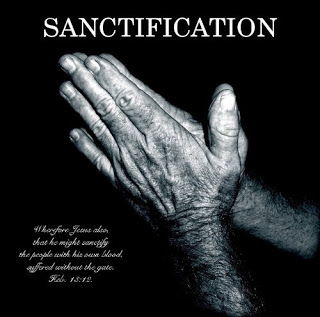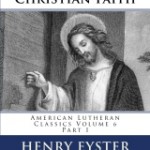The following is a section from my chapter “New Life in Christ: Sanctification and Vocation” in my upcoming book on Reformed and Lutheran theology,
 The primary reason why justification assumes a theological priority over sanctification is that it is a completed act. The work of justification establishes God’s eschatological verdict of “righteous” placed upon the sinner. As Romans 4:5 states, “And to the one who does not work but believes in him who justifies the ungodly, his faith is counted as righteousness.” As was discussed in the previous chapter, this text has specific reference to Abraham. In Genesis 12 Abraham was made an heir of the covenant, given the promise of being the forefather of the future messiah and the nation of Israel. Thus Abraham’s journey of faith began earlier than the text Paul utilizes from chapter 15 wherein Abraham’s faith was credited as righteousness. Paul explicitly labels Abraham as one who “does not work” and even calls him “ungodly.” This does not refer merely to the beginning of Abraham’s life of faith, in which he would become godly and righteous by his own strength, but to the Abraham who had already left his pagan idolatry in order to serve God. Thus even after Abraham had some level of sanctification and displayed that through his good works, he is still labeled by Paul as ungodly, and is righteous apart from works. This demonstrates that justification is primary, not only in the beginning of the Christian life, but in one’s continual journey in faith. Even after one is sanctified to an extent one can still be labeled as “ungodly” and “without works.”
The primary reason why justification assumes a theological priority over sanctification is that it is a completed act. The work of justification establishes God’s eschatological verdict of “righteous” placed upon the sinner. As Romans 4:5 states, “And to the one who does not work but believes in him who justifies the ungodly, his faith is counted as righteousness.” As was discussed in the previous chapter, this text has specific reference to Abraham. In Genesis 12 Abraham was made an heir of the covenant, given the promise of being the forefather of the future messiah and the nation of Israel. Thus Abraham’s journey of faith began earlier than the text Paul utilizes from chapter 15 wherein Abraham’s faith was credited as righteousness. Paul explicitly labels Abraham as one who “does not work” and even calls him “ungodly.” This does not refer merely to the beginning of Abraham’s life of faith, in which he would become godly and righteous by his own strength, but to the Abraham who had already left his pagan idolatry in order to serve God. Thus even after Abraham had some level of sanctification and displayed that through his good works, he is still labeled by Paul as ungodly, and is righteous apart from works. This demonstrates that justification is primary, not only in the beginning of the Christian life, but in one’s continual journey in faith. Even after one is sanctified to an extent one can still be labeled as “ungodly” and “without works.”
There is a prominent pastoral concern in this discussion as well. As one progresses in the Christian life, rather than seeing victory over sin, one often struggles with the fact that the sins which should be done away with keep returning. The old Adam continually reasserts himself, bringing God’s children back into the sin which previously enslaved them. If I as a pastor were to emphasize the work of sanctification and progress in the Christian life, one’s state of mind would likely become that of despair. The progress that we hope to find in our spiritual journeys simply isn’t there. Rather than pointing to that work of God which is still incomplete, that work by which God would still only be able to call his people “ungodly”, I as a pastor have a duty to point to that work of God which is complete, that work by which alone one will be received into God’s kingdom and participate in the resurrection unto life. Alien righteousness is full and complete, and is the only thing which one can cling to in assurance that eternal life is a present possession, not the incomplete work of renewal which will only lead to the Christian’s realization of their failure to progress as far as they should.
Paul demonstrates this principle in a pastoral manner in the first epistle to the Corinthians. Of all his letters, this is the one in which Paul deals with the broadest moral problems. The Corinthian congregation is struggling with sectarianism, sexual immorality, a lack of concern for the sins of others, and a tendency to take other Christians to court. Amidst this group of people, seemingly lacking the fruits of sanctification, Paul is willing to address them as “saints.” Even though they are full of obvious sin that Paul addresses throughout this epistle, they are righteous and holy people. After chastising the Corinthians for their tendency to desire taking others to a law court in order to settle church disputes, Paul warns them that those who practice wickedness will not inherit the kingdom of God. Rather than pointing them, then, to the sinfulness of their own lives, and the lack of fruit that they demonstrate, he reminds them of something which is a past reality. He states, “And such were some of you. But you were washed, you were sanctified, you were justified in the name of the Lord Jesus Christ and by the Spirit of our God.” He reminds the Corinthians that even though they demonstrate all sorts of sin and wickedness within their congregation, these sins do not define who they are in Christ. Though previously slaves to sin, the Corinthians have now been baptized into Christ, they have been set apart, they have been declared righteous and their sins have been forgiven. Even in the midst of a situation of profound sin, Paul is willing to assure the Corinthian believers of their status before God by their baptisms and their justification.











